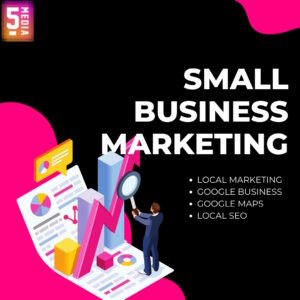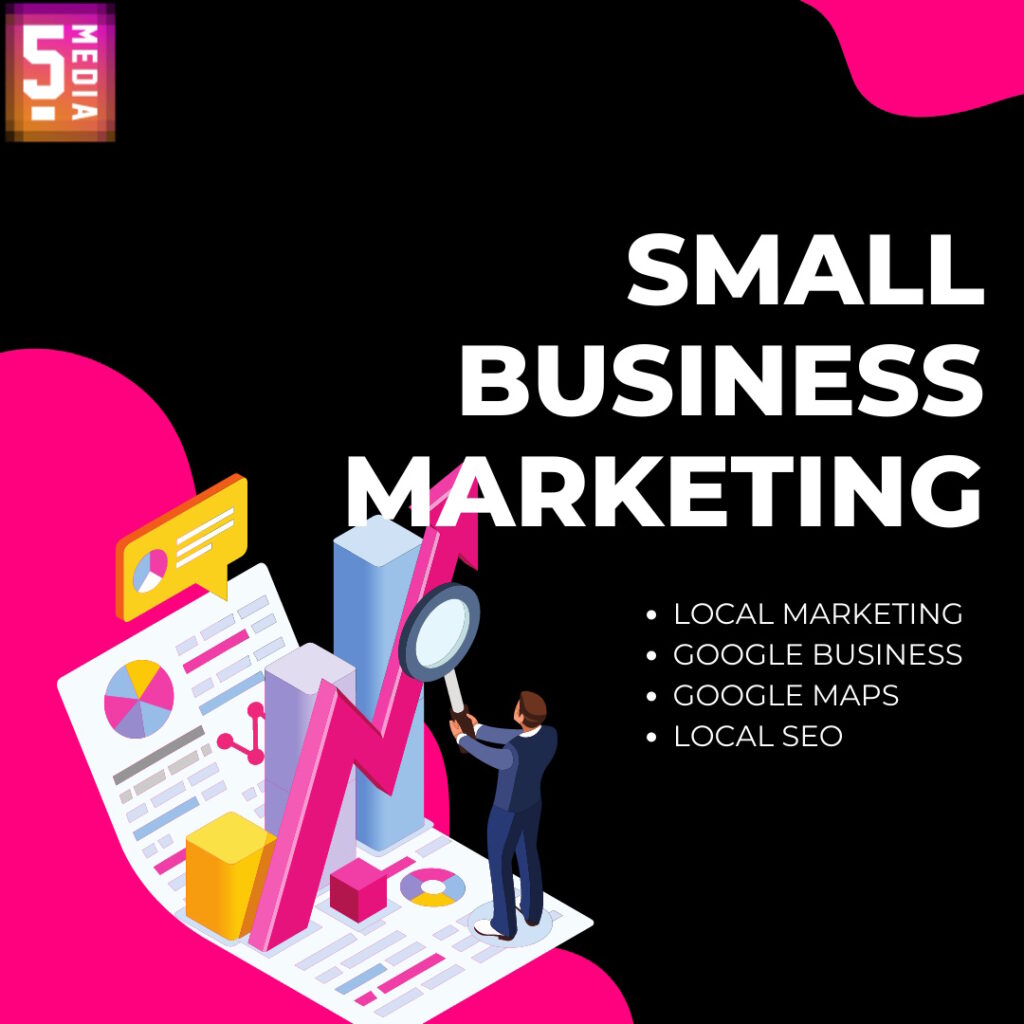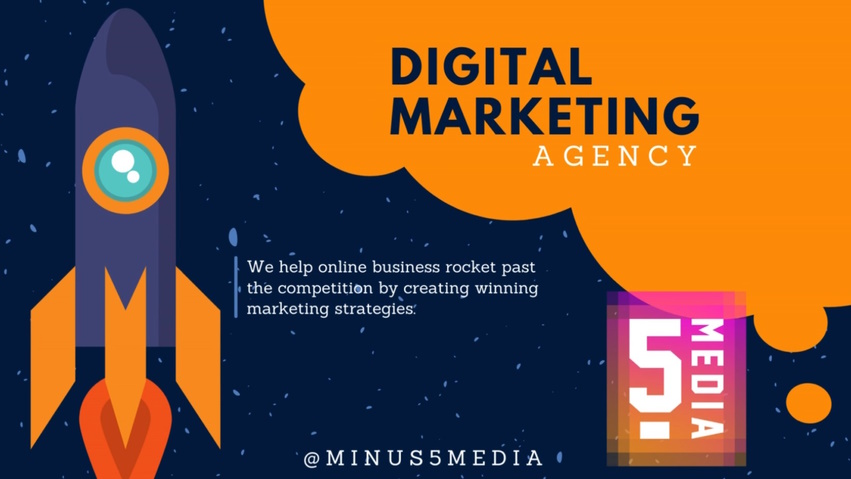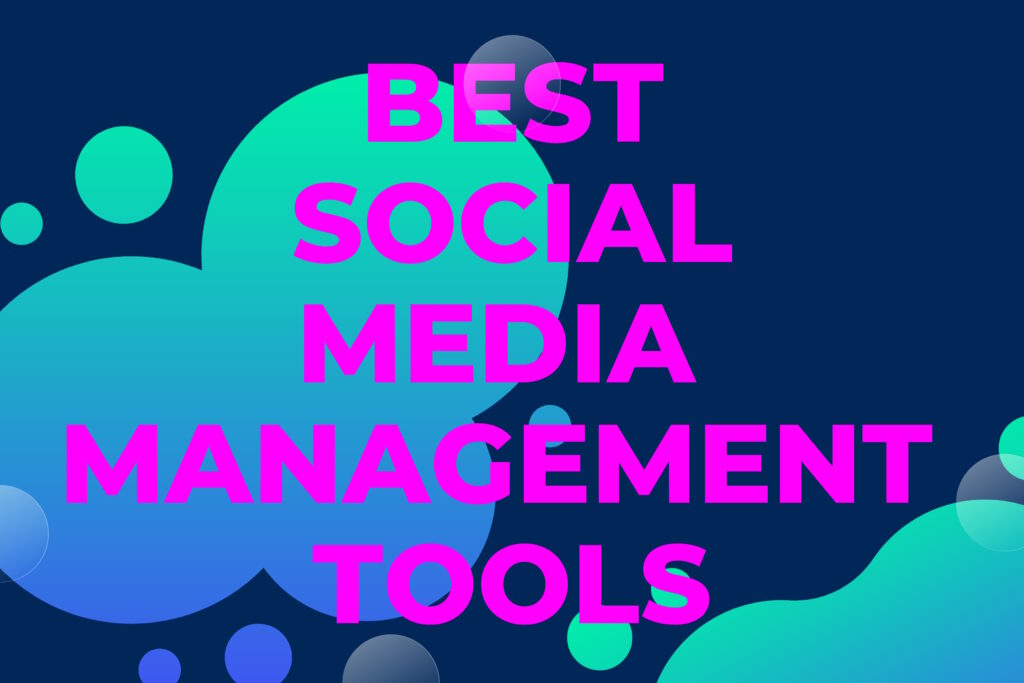Small Business Marketing and Local Marketing for Small Businesses – In today’s rapidly evolving business world, digital marketing has become an indispensable tool for small businesses looking to improve sales, expand their audience, and stay competitive. With more and more consumers turning to the internet for information, products, and services, having a strong online presence is crucial for small business owners to succeed.
In this blog post, we’ll explore various digital marketing strategies that can help your small business thrive in the digital space, along with practical tips and real-world success stories.
Use Digital Marketing To Market Your Small Business
This post aims to provide small business owners with practical and effective strategies for online marketing themselves in the digital space.
-
- A digital marketing strategy levels the playing field, allowing small businesses to compete with larger players.
-
- The internet’s widespread use makes digital marketing essential for reaching a global audience.
-
- Effective digital marketing strategies can lead to increased brand awareness, customer engagement, and sales.
Understanding the Digital Landscape
The digital landscape is vast and comprises various platforms such as websites, social media plat, email, mobile apps, and search engines. As a small business owner, it is imperative to understand which platforms are most effective for reaching your target audience.
Additionally, knowing your goals, whether it’s brand awareness, lead generation, or customer retention, can help in crafting a more targeted and effective online marketing strategy.
-
- Familiarising oneself with the digital landscape helps in making informed digital marketing strategy decisions.
-
- Identifying the target audience helps in customising digital marketing content for better engagement.
-
- Setting clear and measurable goals is the first step towards a successful digital marketing campaign.
Creating a Professional Website
A website acts as the virtual storefront for your business. It’s often the first point of contact potential customers have with your brand. Therefore, creating a professional and aesthetically pleasing website is paramount. Your website should also be easy to navigate, mobile-friendly, and loaded with valuable content.
Optimising your website for search engines (SEO) can help in improving its ranking on search engine results pages (SERPs), making it easier for potential customers to find you:
-
- A professional website enhances brand image and credibility.
-
- A mobile-friendly, user-friendly design ensures a better user experience.
-
- Implementing SEO practices increases visibility and helps in reaching a wider audience.
Social Media Presence
With billions of users worldwide, social media accounts like Facebook, Twitter, Instagram, and LinkedIn offer enormous potential for businesses to build an online community. Select platforms that align with your target audience and create engaging content that resonates with them.
Be consistent in posting and engaging with your followers through comments, messages, and sharing content. Utilising social media content calendar will allow you to create a social media posting schedule for your social channels to help with brand loyalty with your targeted audience:
-
- Selecting the right social media plat ensures that your content reaches the intended audience.
-
- Regular posting and engagement help in building a community and customer loyalty.
-
- User-generated content and social media platform interactions humanise the brand and create trust.
Social Media Marketing
What is Social Media Marketing?
Social Media Marketing (SMM) is the practice of using social media sites to promote products, services, or brands to a wide audience. It involves creating and sharing content, including text posts, images, videos, and other media, to achieve digital marketing and branding goals.
Social media marketing encompasses various activities such as posting updates, engaging with followers, running advertisements, and analysing results to enhance performance.
Social media platforms like Facebook, Instagram, Twitter, and LinkedIn offer a cost-effective way for small businesses to engage with their target audience, build brand awareness, and promote their products or services. Here’s how to make the most of social media marketing:
- Choose the right platforms: Focus on the platforms that your target audience uses the most. For instance, if you’re targeting young adults, Instagram and Snapchat might be your best bets.
- Post consistently: Create a content calendar to plan and schedule your posts. This will help you maintain a consistent posting schedule and keep your audience engaged.
- Engage with your audience: Respond to comments and messages and encourage user-generated content to create an active community around your brand.
- Leverage influencers: Partner with influencers in your niche to reach a broader audience and boost credibility.
Success story: Gymshark, a fitness apparel brand, leveraged social media platform influencers and built a community around their products, which led to rapid growth and a loyal customer base.
Email Marketing
What is Email Marketing?
Email marketing is a digital marketing that involves sending emails to a targeted group of recipients with the goal of promoting products, and services, or building relationships with customers. It’s one of the most direct and effective ways of communicating with leads, nurturing them, and turning them into customers.
An email marketing strategy remains one of the most effective digital marketing strategies, offering an impressive ROI. To make the most of your email marketing campaigns:
Build your list: Offer incentives like discounts or exclusive content to encourage visitors to subscribe to your newsletter.
Segment your list: Group subscribers based on their preferences, behaviours, or demographics to send targeted and relevant content.
Craft compelling content: Use engaging subject lines, personalise your emails, and include clear calls to action to drive conversions.
Monitor performance: Track open rates, click-through rates, and other key metrics to optimise your email campaigns.
Success story: Beardbrand, a men’s grooming company, used targeted email campaigns to nurture leads and convert them into paying customers, contributing significantly to their growth.
Content Marketing
What is Content Management?
Content Management refers to the process of creating, organising, publishing, and maintaining digital content. It often involves text, images, videos, audio, and other multimedia elements. Content Management is essential for websites, blogs, social media, and other platforms where content is regularly updated.
Content marketing involves creating valuable, relevant, and consistent content to attract and engage your target audience. To excel in content marketing:
Identify your target audience: Understand their needs, preferences, and pain points to create content that resonates with them.
Create diverse content: Develop a mix of blog posts, infographics, videos, podcasts, and more to cater to different audience preferences.
Optimise for SEO: Research keywords and optimise your content for search engines to increase visibility and drive organic traffic.
Promote your content: Share your content across your social media channels, email newsletters, and other platforms to reach a wider audience.
Success story: Moz, an SEO software company, built its reputation through its informative blog and educational resources, establishing itself as an industry leader.
PPC Advertising
What is PPC Advertising?
PPC, PPC Marketing, or Pay-Per-Click advertising is a digital marketing model where advertisers pay a fee each time their ad is clicked by a user. Essentially, it’s a method of buying visits to your website or landing page, rather than attempting to “earn” those visits organically through SEO. PPC is commonly associated with search engine advertising, but it also applies to social media platforms and other websites.
Pay-per-click (PPC) advertising enables businesses to display ads on search engines and social media platforms, paying only when a user clicks on the ad. To make the most of PPC advertising:
Set clear goals: Define your objectives, such as increasing brand awareness or driving sales, to guide your campaign strategy.
Target the right keywords: Research high-intent keywords that are relevant to your business and have a reasonable cost-per-click (CPC).
Create compelling ad copy: Write attention-grabbing headlines and persuasive ad copy to encourage users to click on your ads.
Monitor and optimise: Track campaign performance and adjust your bids, keywords, and ad copy to maximise ROI.
Success story: MVMT Watches used PPC advertising to drive traffic to their website and generate sales, contributing to their rapid growth and eventual acquisition by Movado Group.
Video Marketing
What is Video Marketing?
Video marketing or VM is a digital marketing strategy that involves using videos to promote products, services, or brand identity. In an era where visual content often has more impact than text, VM has become an essential tool for businesses to engage with their target audience and convey messages more effectively. Here’s an overview of VM and its key elements:
Why Video Marketing is Important?
Engagement: Videos are highly engaging and can keep viewers’ attention for a longer time compared to text or images.
Information Delivery: They are an excellent way to convey a large amount of information quickly and entertainingly.
Trust and Credibility: Videos, especially those that feature real people, can help build trust and establish credibility for your brand.
Boost Conversion Rates: Including videos on landing pages and in email campaigns has been shown to increase conversion rates.
SEO Benefits: Having video content can improve your website’s SEO as search engines often prioritize content that engages users.
Local SEO
What is Local SEO?
Local SEO, or Local Search Engine Optimisation, is a subset of SEO that focuses on optimising a website to be found in local search results. It’s especially important for brick-and-mortar businesses and service providers that operate in specific geographical areas. Local SEO helps in improving online visibility for local consumers who are searching for products or services near them.
Local SEO is a powerful digital marketing tactic that focuses on optimizing a website to appear in local search results. It helps small businesses attract customers from their locality or region by optimizing their website and online business presence for relevant keywords. Local SEO is an effective way to reach out to potential customers who are looking for products and services near them. Here’s how to do it:
Optimise your website: Make sure your business information is accurate and up to date on all platforms, including Google My Business, Yelp, and TripAdvisor.
Create quality content: Develop content that focuses on topics of interest in your local area to capture the attention of local customers.
Earn backlinks: Reach out to other local businesses or websites and ask them for links to improve your website’s rankings.
Make use of local keywords: Research relevant local keywords and include them in your content to attract local customers.
Success story: A small business in the US used Local SEO to increase its organic traffic by 600% within 2 months, boosting its online visibility and customer base significantly.
Google Business & Google Map Listing
What are Google Business & Google Map Listings?
Google Business (GB) and Google Maps listings are two interrelated features offered by Google to help businesses improve their online presence and make it easier for potential customers to find them.
Google Business (GB): GB is a free tool provided by Google that allows business owners to create and manage a listing that appears in search results when people are searching for products or services similar to what the business offers. This listing includes important information such as the business name, address, phone number, website, hours of operation, and customer reviews. It’s essential for local SEO as it helps businesses to appear in local search results and provides users with quick information about the business.
Google Maps Listings: When a business creates and verifies its GMB listing, the business’s location will also appear on Google Maps. This is crucial for helping potential customers find the physical location of the business. Google Maps listings show not only the business’s location but also additional information from the GMB listing, such as hours of operation, contact information, and customer reviews. Users can also get directions to the business through Google Maps.
Google Business is primarily for managing how your business information appears in Google Search and Google Maps. Google Maps listing is an extension of GB and focuses on displaying your business location on maps.
For local businesses, properly setting up and optimising both the GB and Google Maps listings is essential. This helps to:
-
- Increase the visibility in local search results.
-
- Provide potential customers with essential information.
-
- Improve the chances of attracting foot traffic by helping people easily locate the business.
-
- Build credibility through customer reviews and ratings.
Google Business is essential for small businesses to gain exposure and reach local customers. It allows businesses to create and manage their profile on Google, which consists of a business name, contact details, location, hours of operation, photos, reviews, and more. With a complete Google My Business profile, businesses are more likely to be found by potential customers searching online, making local SEO much more effective. To get the most out of Google Business:
Complete your profile: Add accurate and up-to-date information to appear in more local search results.
Post regularly: Create posts with relevant content, such as special offers or upcoming events, to keep your page active.
Respond to reviews: Monitor customer reviews and respond promptly to both positive and negative comments.
Optimise for voice search: Include long-tail keywords and natural phrases that are more likely to be used in voice searches.
Success story: A small business in the UK saw a 550% increase in traffic after optimising its Google Business profile, leading to an increase in sales and customer loyalty.
The Benefits of Digital Marketing Strategy
The digital marketing landscape offers an array of powerful tools and strategies that businesses can leverage to improve their visibility, reach new customers, and increase sales. Here are some of the key benefits of digital marketing for small businesses:
Cost-Effective Strategies: Digital marketing strategies like social media marketing, email marketing, content marketing, and PPC advertising are far more cost-effective than traditional marketing channels.
Flexible Targeting Options: Digital marketing platforms offer a variety of targeting options, enabling businesses to reach the right people at the right time.
Measurable Results: With digital marketing, businesses can track real-time results and optimise their campaigns accordingly for maximum ROI.
Local SEO: With Local SEO, businesses can attract local customers in their area and establish themselves as a trusted presence in the community.
Digital marketing has become an invaluable tool for small businesses looking to grow and compete in the digital space. By leveraging cost-effective strategies and targeting options, businesses of any size can take advantage of the reach and power of digital marketing.
Practical Tips for Digital Marketing Success
Digital marketing offers a wealth of opportunities for small businesses to grow and succeed in today’s competitive landscape. Define your target audience and tailor your digital marketing efforts to their preferences and behaviours.
1. Set measurable goals and track your progress to optimise your strategies.
2. Test different approaches and tactics to find out what works best for your business.
3. Allocate your budget wisely across different digital marketing campaigns to maximise ROI
By implementing the strategies discussed in this article, you’ll be well on your way to expanding your audience, increasing sales, and making your mark in the digital space. Don’t wait – start leveraging these digital marketing strategies for your small business today!
Can a Digital Agency Help My Small Business?
Small businesses seeking to elevate their online presence and bolster their digital marketing strategies would find a digital agency to be an indispensable ally. The professionals housed within digital agencies possess a diverse array of expertise in fields such as SEO, PPC, social media marketing, and marketing. These experts can devise digital marketing strategies that are specifically tailored to a business’s goals and target audience.
One of the pivotal services provided by digital agencies is website development and optimisation. Creating an aesthetically appealing and functional website lays the foundation for an effective online presence. Moreover, digital agencies specialise in search engine optimisation (SEO), ensuring that the website is easily discoverable by potential customers. They also focus on creating a user-friendly experience with quick load times, which is crucial for keeping visitors engaged.
In addition to web development, digital agencies are instrumental in brand development. Through the creation of logos and the design of marketing materials, agencies can assist in forging a strong brand identity. When a brand is consistently represented across all platforms, it engenders trust and recognition among its audience.
An area that demands particular attention is a social media strategy, and managing it effectively can be quite labour-intensive. This is where a digital agency can come in to take the reins. They handle the creation of content, engage with the audience, and employ analytics to gauge the growth of your online community and brand presence.
For small businesses, optimising local business searches is imperative. Digital agencies excel at ensuring that your online listings are primed for local searches, particularly through the management and optimisation of Google My Business and Google Maps listings. This not only ensures that your business is discoverable online but also makes it easier for local customers to find your physical location.
What sets digital agencies apart is their proficiency in making data-driven decisions. Through analytics, they can monitor the performance of your online campaigns and website. The insights gleaned from this data are invaluable for making informed decisions and optimising strategies for better results.
Furthermore, digital agencies can supercharge your email marketing efforts. From segmenting email lists to designing visually arresting newsletters, agencies ensure that your email communications strike a chord with your audience
One of the most significant benefits of partnering with a digital agency and digital marketers is the time and resources it frees up. This allows you to focus on the core operations of your business, which is especially beneficial if you have a small team.
Another advantage of working with a digital agency is its knack for staying abreast of the latest trends and technologies. They can ensure that your business remains ahead of the curve and can swiftly adapt to capitalise on emerging opportunities.
Lastly, through meticulously crafted campaigns and continuous optimisation, digital agencies strive to maximise your return on investment and conversion rates. This contributes to driving more traffic and sales, which are integral to the growth of your business.
A digital agency can equip a small business with the tools and expertise needed to flourish in the digital world. However, it is vital to choose an agency that understands your industry and aligns with your business objectives. It’s also prudent to take into account the costs involved and assess whether they are compatible with your budget.
Questions To Ask A Digital Agency Before Hiring Them
When considering hiring a digital agency, it’s important to make an informed decision. Asking the right questions can help you understand if the agency is a good fit for your business. Here are some crucial questions to ask a digital agency before hiring them:
Can You Provide Case Studies or Examples of Past Work?
Request case studies or examples that demonstrate the agency’s experience and success in projects similar to yours.
What Services Do You Specialise In?
Understand the core competencies of the agency. Some agencies might be strong in SEO, while others excel in social media posts or web development.
How Do You Measure Success and What KPIs Do You Focus On?
Ask about the metrics they use to gauge the success of campaigns and how these align with your business goals.
Who Will Be Working on My Account?
Inquire about the team members who will be directly involved with your account, and ask about their experience and qualifications.
How Do You Stay Up to Date with Industry Changes and Trends?
Digital marketing is constantly evolving. Make sure the agency is committed to staying current with industry changes.
How Will You Communicate and Report Progress?
Establish how often you will receive updates and reports, and through which communication channels.
Can You Provide References or Testimonials from Past Clients?
Ask for references or testimonials to get insights from previous clients regarding their experience with the agency.
How Do You Handle Content Creation and Strategy?
If content marketing is a priority for you, ask how they plan, create, and distribute content.
What Is Your Pricing Structure and Are There Any Hidden Costs?
Understand the pricing model, what services are included, and if any additional costs might arise during the project.
What Is Your Approach to SEO?
If SEO is important for your business, ask about their strategies, the tools they use, and how they keep up with algorithm updates.
How Do You Handle Social Media Management and Advertising?
If social media is a focus, ask about their strategies for organic posts and paid advertisements.
How Will You Customise Your Services to My Business’s Needs and Goals?
Ensure that the agency is willing to tailor their services to suit the specific needs and objectives of your business.
What Is the Contract Duration and What Happens if I Want to Terminate Early?
Understand the terms of the contract, including the duration and conditions for early termination.
How Do You Handle Data Security and Privacy?
Inquire about the measures they take to ensure the security and privacy of your data.
Can You Describe a Challenging Project You Worked on and How You Overcame the Challenges?
This question can give you insight into how the agency handles adversity and problem-solving.
By asking these questions, you can gain a better understanding of the agency’s capabilities, communication style, and whether they are the right fit for your business. Make sure to also listen to your intuition and consider if you feel comfortable and confident in establishing a partnership with them.
Get The Competitive Edge With Minus 5 Media

Through our suite of comprehensive digital marketing services, we’re committed to helping you Get The Competitive Edge. Our expertise ranges from SEO, social media management, and content marketing, to web development, analytics, and much more. We’re here to ensure that your brand not only survives but flourishes in the digital realm.
Your success is our success, and we firmly believe in growing together. We pride ourselves in being not just a service provider, but a partner that is deeply invested in your goals and aspirations.
Ready to take your business to the next level? Get The Competitive Edge you’ve been looking for with Minus 5 Media. Don’t hesitate to reach out to us for an insightful consultation and to learn how we can tailor our services to meet your unique needs.
Stay tuned for more valuable insights by subscribing to our newsletter and following us on our social media channels. Together, let’s create a digital presence that’s impactful and enduring.
We now have offices in Manchester UK and Malaga, Spains (Digital Marketing Agency Malaga), so we’re well placed to help you and your brand to get the competitive edge. – Agencia De Marketing Digital España!




